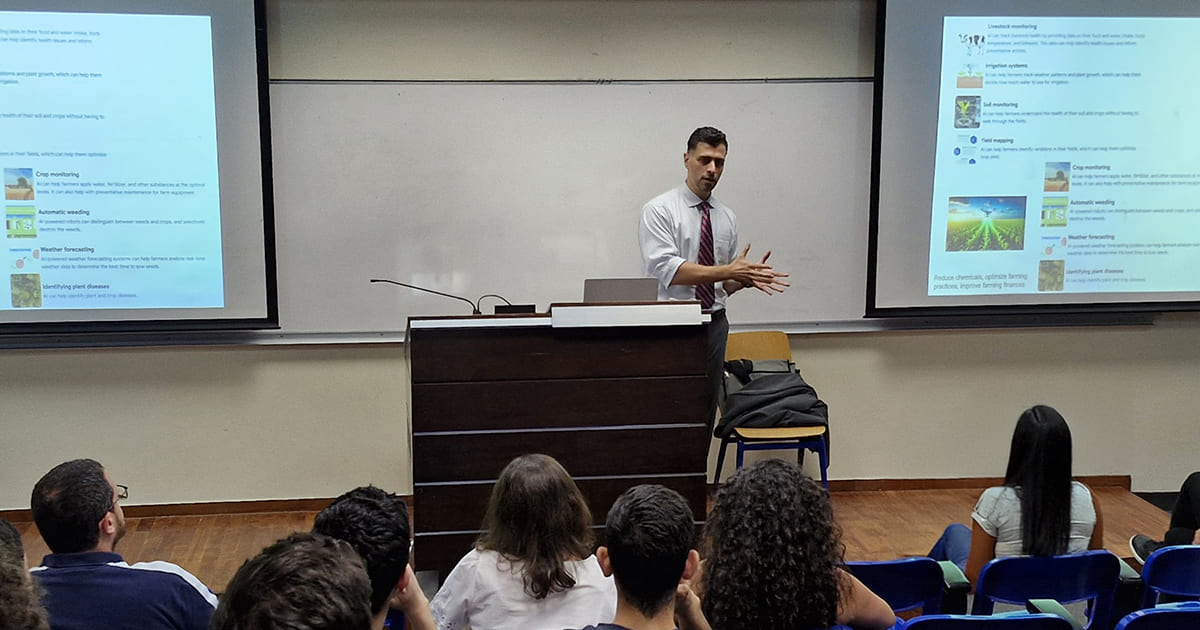SOE Launches its Distinguished Scholars Visiting Program with International Guest Dr. Feras Batarseh
Associate Professor Batarseh joins the LAU community to teach AI foundations, engage in research and knowledge exchange, and strengthen the school’s global outreach.
Driven by its mission to localize global knowledge and enrich the academic ecosystem, the LAU School of Engineering (SOE) launched its Distinguished Scholars Visiting Program (DSVP) this summer. The initiative invites leading global experts to engage with the university community through teaching, research, and addressing urgent regional challenges via interdisciplinary partnerships.
“This program allows us to bring global thought leaders into direct dialogue with our students and faculty,” said Dr. Michel Khoury, dean of the SOE. “Through hands-on teaching and research collaboration, we’re building bridges between international expertise and the region’s most pressing needs.”
The DSVP’s inaugural scholar, Associate Professor Feras Batarseh from Virginia Tech’s (VT) Department of Biological Systems Engineering and Commonwealth Cyber Initiative (CCI), embodied this mission during the summer semester of 2025.
Beyond teaching a newly developed course at the Byblos campus, Trustworthy and Secure AI, for engineering students across all disciplines, Dr. Batarseh engaged deeply with faculty, explored collaborative research opportunities, and connected with key stakeholders in Lebanon’s critical infrastructure sectors.
A leading voice in artificial intelligence and biological systems, Dr. Batarseh heads the Artificial Intelligence Assurance and Applications Lab (A3 Lab) and the AI & Cyber for Water & Ag (ACWA) Lab at VT. His research covers AI’s applications in water security, cyberbiosecurity, smart agriculture, and public policy, with a special focus on assurance areas such as explainability—the ability to clearly understand and communicate how AI systems make decisions—trustworthiness, data bias, and the often-overlooked impact of dark data, which refers to the vast amounts of information organizations collect but rarely analyze or use.
During his visit at LAU, he successfully translated this global expertise into locally relevant solutions, exemplifying the DSVP’s dedication to meaningful knowledge exchange.
In the classroom, Dr. Batarseh aimed to make AI accessible to students while showcasing its applicability across sectors through the development of context-specific, ethical, and socially responsible AI systems.
“Today, every university offers AI courses,” he noted, “but very few focus on how to build trustworthy AI—to develop it in a way that fits a particular context and allows for seamless user adoption.”
The course also sought to challenge growing public skepticism toward AI, encouraging critical understanding over fear. “AI is powerful. If built incorrectly, it can be harmful. But if built right, it can be a force for good, for students, for society, even for the country,” he added.
Students praised the course’s innovative approach. First-year industrial engineering student Lara Maalouf described it as “an eye-opener,” highlighting how it sparked her curiosity and provided a strong foundation without being overwhelming.
Second-year computer engineering student Sophie Klim appreciated the blend of theory and real-world relevance, noting how discussions included cutting-edge research and applications in water systems and cybersecurity. For second-year computer engineering student Karim Sakr, the course emphasized the human side of AI, exploring pillars like ethics, safety, fairness, and explainability, and focusing on communicating AI outcomes to diverse audiences, including farmers and policymakers.
Dr. Batarseh’s academic contributions as a distinguished visiting scholar, however, extended well beyond teaching. He held collaborative meetings with faculty across departments to explore research tailored to Lebanon’s pressing infrastructure challenges, particularly in water and agriculture.
“The water issues in Lebanon are completely different from those in other countries in the region,” he explained. “Unless you meet with local operators, engineers, and farmers, and understand these systems on the ground, you can’t design AI solutions that work for the local context.”
This approach underpins his broader vision of fostering regional, multidisciplinary research networks—a vision already realized through his lab’s collaborations in Jordan, Tunis and Qatar, with LAU now joining this growing academic map.
Despite the challenges Lebanon faces, such as inconsistent electricity and an underdeveloped tech infrastructure, Dr. Batarseh remained optimistic about its potential.
Meaningful AI work can be done using small-scale, accessible, open-source tools suited to local constraints, he said, adding, “Students here are resilient. They want to use AI in their capstones, their careers. They understand the limitations but are eager to push past them.”
As part of the program’s outreach, Dr. Batarseh delivered a public seminar on July 8, 2025, titled Optimizing and Securing Critical Infrastructures in Lebanon Using AI. Drawing from his lab’s pioneering research, he highlighted how AI can address urgent challenges in agriculture and water management, sectors vital to Lebanon’s sustainability.
The seminar impressed on the faculty and students in attendance the urgency of adopting AI amid digitization and data-driven governance, showcasing how smart irrigation, crop monitoring, and optimized water treatment can vastly improve resource management. It also highlighted the critical need for context-aware AI solutions to overcome data scarcity, infrastructure gaps, and user distrust, key barriers to adoption across Lebanon, the Levant and the broader MENA region.
With collaborative projects already underway and co-authored research in development, Dr. Batarseh’s visit truly embodied SOE’s vision through DSVP: To bring global expertise into local classrooms, enrich learning through meaningful exchange, and cultivate lasting partnerships that strengthen LAU’s role as a hub for international academic collaboration and a catalyst for future-ready engineering education.
